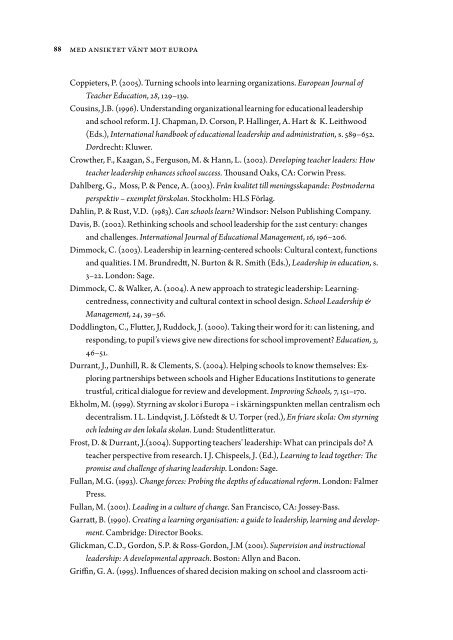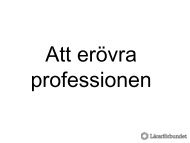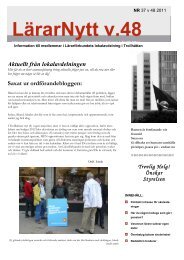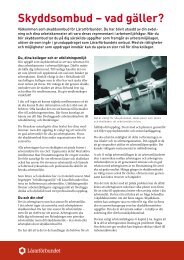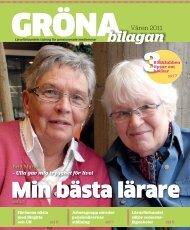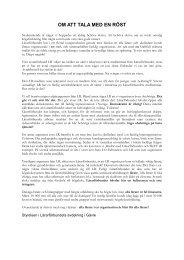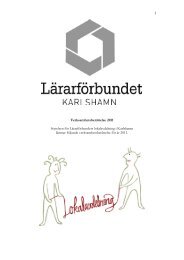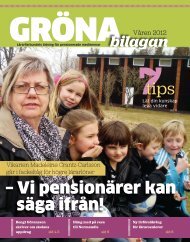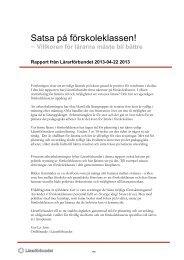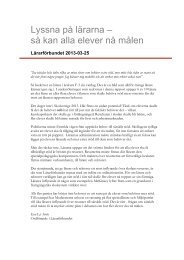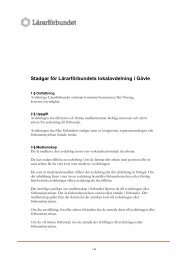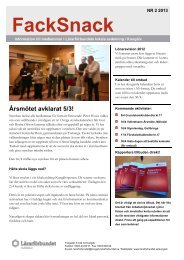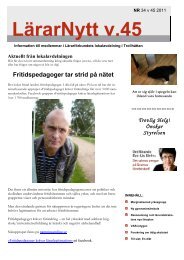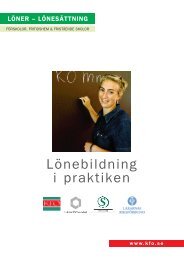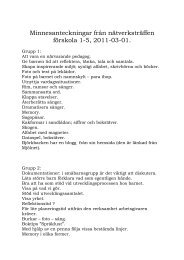Med ansiktet vänt mot Europa - Lärarförbundet
Med ansiktet vänt mot Europa - Lärarförbundet
Med ansiktet vänt mot Europa - Lärarförbundet
Create successful ePaper yourself
Turn your PDF publications into a flip-book with our unique Google optimized e-Paper software.
88 med <strong>ansiktet</strong> <strong>vänt</strong> <strong>mot</strong> europa<br />
Coppieters, P. (2005). Turning schools into learning organizations. European Journal of<br />
Teacher Education, 28, 129–139.<br />
Cousins, J.B. (1996). Understanding organizational learning for educational leadership<br />
and school reform. I J. Chapman, D. Corson, P. Hallinger, A. Hart & K. Leithwood<br />
(Eds.), International handbook of educational leadership and administration, s. 589–652.<br />
Dordrecht: Kluwer.<br />
Crowther, F., Kaagan, S., Ferguson, M. & Hann, L. (2002). Developing teacher leaders: How<br />
teacher leadership enhances school success. Thousand Oaks, CA: Corwin Press.<br />
Dahlberg, G., Moss, P. & Pence, A. (2003). Från kvalitet till meningsskapande: Postmoderna<br />
perspektiv – exemplet förskolan. Stockholm: HLS Förlag.<br />
Dahlin, P. & Rust, V.D. (1983). Can schools learn? Windsor: Nelson Publishing Company.<br />
Davis, B. (2002). Rethinking schools and school leadership for the 21st century: changes<br />
and challenges. International Journal of Educational Management, 16, 196–206.<br />
Dimmock, C. (2003). Leadership in learning-centered schools: Cultural context, functions<br />
and qualities. I M. Brundredtt, N. Burton & R. Smith (Eds.), Leadership in education, s.<br />
3–22. London: Sage.<br />
Dimmock, C. & Walker, A. (2004). A new approach to strategic leadership: Learningcentredness,<br />
connectivity and cultural context in school design. School Leadership &<br />
Management, 24, 39–56.<br />
Doddlington, C., Flutter, J, Ruddock, J. (2000). Taking their word for it: can listening, and<br />
responding, to pupil’s views give new directions for school improvement? Education, 3,<br />
46–51.<br />
Durrant, J., Dunhill, R. & Clements, S. (2004). Helping schools to know themselves: Exploring<br />
partnerships between schools and Higher Educations Institutions to generate<br />
trustful, critical dialogue for review and development. Improving Schools, 7, 151–170.<br />
Ekholm, M. (1999). Styrning av skolor i <strong>Europa</strong> – i skärningspunkten mellan centralism och<br />
decentralism. I L. Lindqvist, J. Löfstedt & U. Torper (red.), En friare skola: Om styrning<br />
och ledning av den lokala skolan. Lund: Studentlitteratur.<br />
Frost, D. & Durrant, J.(2004). Supporting teachers’ leadership: What can principals do? A<br />
teacher perspective from research. I J. Chispeels, J. (Ed.), Learning to lead together: The<br />
promise and challenge of sharing leadership. London: Sage.<br />
Fullan, M.G. (1993). Change forces: Probing the depths of educational reform. London: Falmer<br />
Press.<br />
Fullan, M. (2001). Leading in a culture of change. San Francisco, CA: Jossey-Bass.<br />
Garratt, B. (1990). Creating a learning organisation: a guide to leadership, learning and development.<br />
Cambridge: Director Books.<br />
Glickman, C.D., Gordon, S.P. & Ross-Gordon, J.M (2001). Supervision and instructional<br />
leadership: A developmental approach. Boston: Allyn and Bacon.<br />
Griffin, G. A. (1995). Influences of shared decision making on school and classroom acti-


